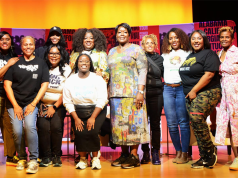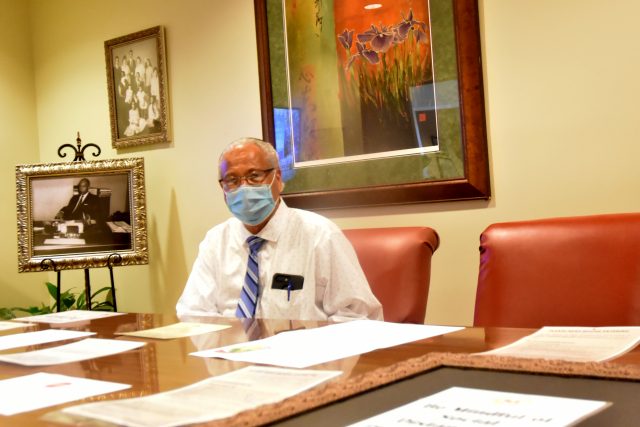
By Solomon Crenshaw Jr.
For the Birmingham Times
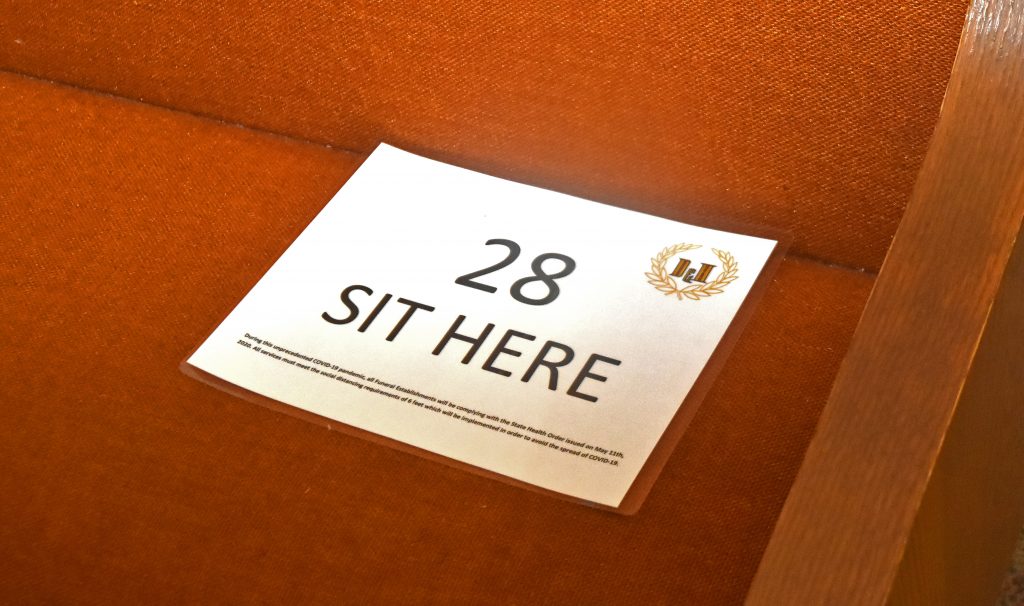
The laminated signs on the pews in the Wilma C. Harris Chapel at Davenport and Harris Funeral Home in North Titusville provide a peek at the new normal of the funeral business.
Before the COVID-19 pandemic, the chapel could hold as many as 250 family and friends honoring the lives of loved ones. Today, that same chapel seats no more than 29 persons, with six feet of space between each attendee.
Social distancing is just one of many changes affecting area funeral business amid the ongoing pandemic. In addition to some funeral homes no longer offering limousine transportation, many homegoing ceremonies are now being livestreamed or recorded and the number of graveside services has increased.
“We’re basically writing a book on how to get through this pandemic,” said Arlillian Kate Bushelon, manager of Bushelon Funeral Home in West End. “Really, all of our colleagues have leaned on each other to assure that we’re doing the best we can to keep ourselves safe.”
“Universal Precautions”
Funeral homes were deemed to be essential when the health crisis forced widespread closures of businesses two months ago. As of June 10, in Jefferson County 47,155 people tested positive for the virus and 112 died from the disease.
Funeral directors acknowledged burying some who died as a result of COVID-19. Though morticians have long been conscious of the possibility of communicable diseases, they are even more mindful of it today.
“It’s at the forefront. I’ll put it that way,” said Howard Johnson of Bessemer’s Johnson Memorial Funeral Directors.
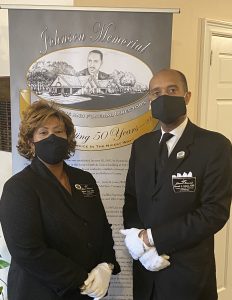
The industry standard calls for “universal precautions,” treating every deceased person in their care as though they are infected with a disease that can be transmitted in the course of handling the body.
“If you know it’s a COVID case, your antennae are up more,” Johnson said.
Paul Gardner, director of Smith and Gaston Funeral Services in North Titusville, said funeral directors are leaning on best-practice guidance from local and state governing organizations in the industry.
“We’re learning on the fly,” he said. “We’re just listening to recommendations, finding out what we need to do. They’re telling us that we need to limit our exposure to the number of people and to socially distance ourselves to help prevent the spread of the virus.”
No Limousines
Often, the deceased will lie in state for visitation and perhaps also for a family hour at the funeral home. Generally, staffers of the facility transport immediate family members to the service in limousines, to the cemetery for the burial, to a repast to break bread, and then to a family home. With concerns about the spread of COVID-19, that has changed.
“We haven’t done cars since March,” Bushelon said. “We’re not doing limos because you can’t socially distance [in the vehicle], and we have to look out for our staff as well. We, as well as quite a few other funeral homes around the area, have elected not to use our delivery service [for family members] right now for the safety of our staff as well as the family.”
State and local health orders limited the number of people who could assemble in one place. Before the latest orders, that number was as low as 10.
“I’ve seen a family decide, ‘Who will the 10 be?’ That’s the most touching thing I’ve seen,” Johnson said.
Some funeral homes have dealt with attendance limitations by shooting video or livestreaming services and have encouraged family members to do that for those who have been unable to travel to the homegoing. Pandemic restrictions have also reduced the number of family members who will meet with the funeral director to make the arrangements; generally, that number has been capped at two.
The New Order
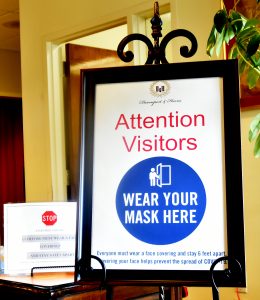
Graveside services have largely become the order of the day. Gardner said Smith and Gaston hasn’t directed a funeral service at a church in more than a month, and it has hosted some in its chapel.
“That has allowed us to be able to have a service, to have the immediate family there,” Gardner said. “We will have a viewing the day before the service. That way other non-immediate family members and the general public have a chance to come in to view, sign the register book, and have some meaningful time with the deceased but not actually attend the funeral.”
Another pandemic-related change: funeral directors have not been able to console families in the manner they have for years.
“I’m known as a hugger, and we cannot comfort,” Bushelon said. “We cannot extend special courtesies like stopping by the house to check on the family and things of that nature because of fear of the spread of the virus.”
Gardner recalled having read that a person could die from a lack of human contact.
“We’re social beings,” he said. “You need that, but right now we’ve just got to refrain from it. Hopefully, when this is all said and done, we can go back to the old normal of what we’re accustomed to.”
Johnson said he and other funeral directors are yearning for a return to what had been common because it’s been so customary in black culture. Nonetheless, he won’t be quick to relax restrictions, even as the governor earlier this month relaxed hers.
“No, sir,” he said. “We’re not opening anything until we feel comfortable and it’s probably gonna be a little while. … We haven’t had much pushback at all from families. They’ve been very understanding.”


